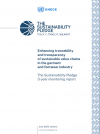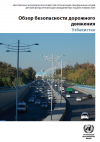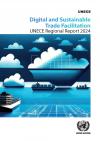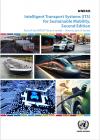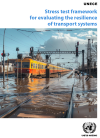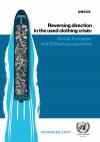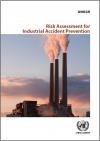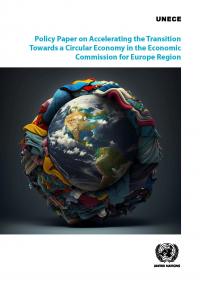Publications
Displaying Results 1 - 20 of 2835
- English
Adopted on 30 September 1957 in Geneva under the auspices of the United Nations Economic Commission for Europe (UNECE), the ADR entered into force on 29 January 1968.
This authoritative Agreement is intended to increase the safety of international transport of dangerous goods by road. Its Annexes A and B contain the technical requirements for road transport, i.e. the conditions under which
- Français
L’ADR, fait à Genève le 30 septembre 1957 sous l'égide de la Commission économique des Nations Unies pour l'Europe, est entré en vigueur le 29 janvier 1968.
Cet Accord est destiné à accroître la sécurité du transport international de marchandises dangereuses par route. Ses annexes A et B imposent les conditions dans lesquelles les marchandises dangereuses, lorsqu'elles ne sont pas interdites,
- English
The Inland Transport Committee (ITC) of the United Nations Economic Commission for Europe (UNECE) adopted its Strategy on Reducing Greenhouse Gas Emissions from Inland Transport (ECE/TRANS/344, annex I) at its eight-sixth session (Geneva, 20-23 February 2024
- English
Most of the world’s water resources are shared between countries. These transboundary waters create social, economic, environmental and political interdependencies that make cooperation a precondition to sustainable development and peace. SDG indicator 6.5.2 measures cooperation on both transboundary river and lake basins, and transboundary aquifers.
The
- English
Most of the world’s freshwater sources are shared between two or more countries. These transboundary waters face significant pressures due to population growth, increasing water demand and the impacts of the triple-planetary crisis of climate change, pollution and biodiversity loss. The sharing of data and information across different levels as well as political, sectoral, environmental and
- English
Through its norms, standards, conventions and policy assistance, UNECE provides practical tools to support countries’ climate change mitigation and adaptation efforts, to leverage financing, and to strengthen collaboration.
Explore resources in this brief overview
- English
The UNECE region is a major source of greenhouse gas emissions, responsible for 34% of the world’s CO2 emissions from fossil fuel combustion. The people of the region are increasingly feeling the impacts of climate change - from wildfires to flooding, heatwaves and drought.
Through its norms, standards, conventions and policy assistance, UNECE provides practical tools to support countries in
- English
The 2023 Edition of the UNECE Guidelines for the Application of Environmental Indicators is available here.
- Pусский
Город Подгорица стремится улучшить общие условия жизни своих жителей и содействовать умному и устойчивому городскому развитию, с тем чтобы стать «умным» и устойчивым городом. Чтобы помочь Подгорице реализовать свои амбиции, Европейская экономическая комиссия Организации Объединенных Наций разработала для Подгорицы Обзор «умного» устойчивого города, начав с оценки успехов города с точки зрения
- English
Road accidents are a major problem in modern societies: annually almost 1.2 million people are killed and 50 million injured globally. Road traffic injuries are estimated to be the eighth leading cause of death globally, and the leading cause for children and young adults aged between 15 and 29 years, thus heavily implicating people who are entering their most productive years. These losses are
- English
“The Sustainability Pledge 3-year monitoring report” presents the results of monitoring activities conducted in the context of the United Nations Economic
Commission for Europe (UNECE)’s Call to Action, the Sustainability Pledge1. The Call to Action was launched in 2021 under the initiative “Enhancing transparency and traceability for more sustainable value chains in the garment and footwear
- Pусский
Дорожно-транспортные происшествия являются серьезной проблемой современного общества: ежегодно в мире погибают почти 1,2 миллиона человек и 50 миллионов получают травмы. По оценкам, дорожно-транспортный травматизм является восьмой основной причиной смерти во всем мире и основной причиной смерти детей и молодых людей в возрасте от 15 до 29 лет, что в значительной степени затрагивает людей,
- English
The fifth United Nations Global Survey on Digital and Sustainable Trade Facilitation, jointly conducted by the five United Nations Regional Commissions and UNCTAD, offers an in-depth and comparative analysis of the implementation of 60 trade facilitation measures in over 160 countries worldwide in 2023. Aside from measures in the WTO TFA, the survey covers the implementation of cutting-edge
- English
The United Nations Economic Commission for Europe (UNECE) has been at the forefront of shaping the future of transport through its Roadmap on Intelligent Transport Systems (ITS). This roadmap, initially adopted in 2012 and recently revised in 2021, lays out a strategic vision for harnessing cutting-edge technologies to significantly improve transportation across the globe. Since 2012, a
- English
This document outlines a comprehensive framework for conducting stress tests and evaluating the resilience of transportation systems.
It is targeted at stakeholders engaged in transportation planning, risk analysis, and decision-making processes. It includes policymakers, transport authorities, engineers, and consultants, providing them with a standardized procedure to conduct stress tests and
- English
The textile industry has evolved from a production model based on natural fibres and protectionist policies for local industry to a model where synthetic fibres have become pervasive, production has been offshored, and the speed of manufacture and distribution of products has increased rapidly. Most of the fashion industry operates under the fast-fashion model, which involves more collections per
- English
Industrial accidents can have severe effects on people, the environment and economies, causing fatalities, disease outbreaks, injuries, environmental pollution, biodiversity loss, conflicts, political instability, financial loss and more. National governments and international organizations have developed legal and policy instruments and tools to prevent, prepare for and respond to industrial
- English
UNECE Policy Brief on Ageing No. 29
A significant portion of older individuals experience mental disorders. Yet, these often go unnoticed and untreated, being overlooked as normal ageing or overshadowed by other health issues. This is especially true for older women, those with lower socio-economic status, and long-term care facility residents. To effectively promote and protect the mental health
- English
This policy paper reviews the state of play of traceability and transparency approaches in three economic sectors critical to the circular transition in the ECE region: the agrifood, garment and footwear, and minerals sectors. Moreover, it provides an overview of the challenges and opportunities for advancing the circular economy and highlights successful practices from the whole region. Lastly,
- English
The second Environmental Performance Review (EPR) of Armenia builds on the substantial experience accumulated by the Economic Commission for Europe (ECE) and its member States in using the EPR tool to regularly assess progress achieved in reconciling national economic and environmental objectives. The second EPR of Armenia takes stock of progress made in the governance and management of the










